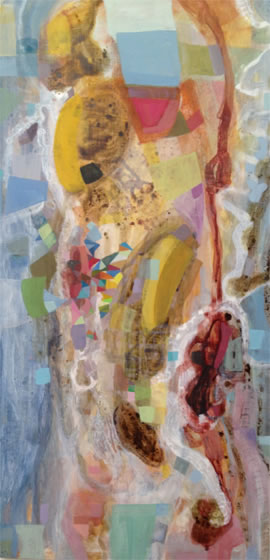Thomas Whitman’s (b. 1960) Aubade for solo English horn, double bass, piano, and three percussionists is lovely atmospheric evocation of the hours prior to sunrise. Wisps and dots of sound surround the English horn a what sound like fleeting allusions to other musical dawns, sunrises, and daybreaks flit by.
Author Archives: WhitmanAdmin
Whitman’s Quartet for Piano and Strings is lush and full of varied energy. Structurally, he confounds our expectations by dropping off the last fast movement of a traditional four-movement quartet, ending instead with an extended slow movement of great atmosphere and beauty.
Whitman’s piano quartet, especially II, is notable for compelling melodic lines. III is gripping and emotionally wrenching.
Was it the power of suggestion – knowing Whitman has written two operas – that made his Piano Quartet seem far more theatrical than chamber music is usually allowed to be? In this extremely attractive study in polarities, the piano charmingly dominates in what seems like a solo sonata with peripheral string commentary. Then, the string trio takes over with spare, smart keyboard contributions. Collage effects in the second movement behave like stage characters, and the eventful third movement happily recalls Faure’s piano quintets with alternating succulent harmonies and unison strings.
The Philadelphia Weekly
The Black Swan does what few modern operas do: it tells a story — a story you can care about, with characters who evolve and interact. Wrapped in beautiful, sensuous music, the piece triumphs…. Whitman’s music is steeped in contrasts: lush passages with brash percussion and intimate, short melodies with cacophony. The music demands and rewards close attention without exhausting the listener.
The Boston Herald
Whitman’s setting [The Black Swan] is colorful and eclectic in idiom…. there is genuinely magical music to depict the famous black swans at Düsseldorf’s Holterhof castle….
The Philadelphia Inquirer
The Black Swan shares many similarities with Britten’s music theatre pieces, including a felicity in setting words so that they shine through and across a melody…. The opera is paced well, moving swiftly through its dozen scenes and musical interludes.
Opera News
In his first opera [The Black Swan], Whitman displayed the savvy skill of a mature composer. He knows how to write dramatic music that soars into lyrical melodies, filled with allusive atmosphere and rich emotional textures.
Broad Street Review
Many contemporary operas consist largely of sung dialogue; their composers carefully avoid the big arias, songs and rousing choruses that opera composers inserted whenever the plot gave them the slightest excuse… But [in A Scandal in Bohemia] Whitman isn’t afraid to seize opportunities for pure musical numbers. When Holmes impersonates a drunken workingman, baritone Markus Beam gets to sing a lyrical song. Watson’s watch aria as he waits for Holmes is another high point…. The love duet between Holmes and Adler is a musical tour de force.
The Philadelphia Inquirer
Whitman’s score [A Scandal in Bohemia]… paints the stage with epigrammatic bits of color… The musical tide rose, instrumental color expanding and vocal writing widening the perspectives. The musical interplay between Heimes and baritone Markus Beam moved through a range of solidly crafted lines that freed the emotions within.

